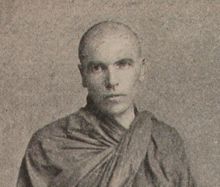2011 Press Releases
24.01.2011
The centenary of the newly-discovered “Irish Buddhist” U Dhammaloka, tried for sedition on January 31st 1911 by a Cork-born judge in colonial Rangoon, will be remembered at UCC on Saturday February 19th 2011, in an event hosted by UCC’s flourishing Study of Religions Department. 'Dhammaloka Day' also sees the Irish launch of the special issue of the journal Contemporary Buddhism (Vol. 11, no. 2, 2010), devoted to this remarkable and unjustly forgotten figure, a Dublin-born [migrant] worker who crossed the world to become a pioneer European Buddhist monk in Asia.
This enigmatic, free thinking Irishman [(ca. 1856-1914)] was known by several
names, including Laurence Carroll and William Colvin. U Dhammaloka was
his Buddhist name given at ordination. Many knew him simply as “the Irish
Buddhist”. The details of his
Dublin family, his life as a hobo in the States and a beachcomber in Asia are
as mysterious as his eventual disappearance or death - and his fake obituary in
1912.
Dhammaloka became a Buddhist monk probably in the 1880s. From 1900 he attracted
frequent press attention in Burma and elsewhere as a popular and controversial
public figure. He lived according to the strict rules of the ancient Burmese
Buddhist monastic order; yellow-robed, shaven-headed, walking barefoot and
taking only one meal a day. Yet Dhammaloka travelled extensively between
1900-1914 in colonial Burma, Siam, Cambodia, Singapore, Malaya, Japan, China,
Ceylon, India, Nepal and beyond. Famous throughout South-East Asia in his
time, he drew crowds of thousands to his speeches, confronting the colonial
establishment and especially Christian missionaries.
Autodidact, atheist, temperance campaigner and Buddhist revivalist, Dhammaloka
was supported in Japan in 1902 by Letitia Jephson of Mallow, denounced in
Singapore in 1905 by journalist Edward Alexander Morphy of Killarney, and tried
for sedition in Burma by Mr. Justice Daniel Harold Ryan Twomey, a native of
Carrigtwohill, Cork and grandfather of the renowned anthropologist Professor
Mary Douglas.
‘Dhammaloka Day' features an international line-up of scholars of
colonial-period and contemporary Buddhism
including Burma expert Prof. Alicia Turner (Toronto), Sri Lanka expert
Dr Elizabeth Harris (Liverpool), historian of American Buddhism Prof. Thomas
Tweed (Austin, Texas), historian of Irish Buddhism Dr Laurence Cox (Maynooth)
and scholar of Japanese religions Prof Brian Bocking (Cork), who is also chair
of Ireland's first department for the non-confessional study of religions, at
UCC.
Uncovering Dhammaloka’s unique story has
taken some inspired detective work on the part of UCC’s Professor Brian Bocking
and his research colleagues Alicia Turner and Laurence Cox, and their efforts
have not been in vain. The lost Irish Buddhist emerges after all these years as
a truly remarkable character, one of the very first Western Buddhists,
pre-dating others who – until now – were regarded as the earliest European
Buddhist monks. [His voice and personality also emerge from the research as by
turns charming, frustrating, witty, grandiose. He was evidently a great
story-teller and a courageous and resourceful individual.
Dhammaloka Day will run from 2.30-6pm in the Boole Lecture Theatre. For details
and registration visit http://www.ucc.ie/en/studyofreligions/dhammaloka-day
(youtube video on Dhammaloka, programme, poster and registration form).
Copies of the Contemporary Buddhism special issue on U Dhammaloka will
be on sale at the Dhammaloka Day event, at the special price of €20. Public enquiries about
attending Dhammaloka Day: email dhammaloka@ucc.ie , or tel. 021 4902773.
Picture: Dhammaloka in 1902 aged approximately 50

